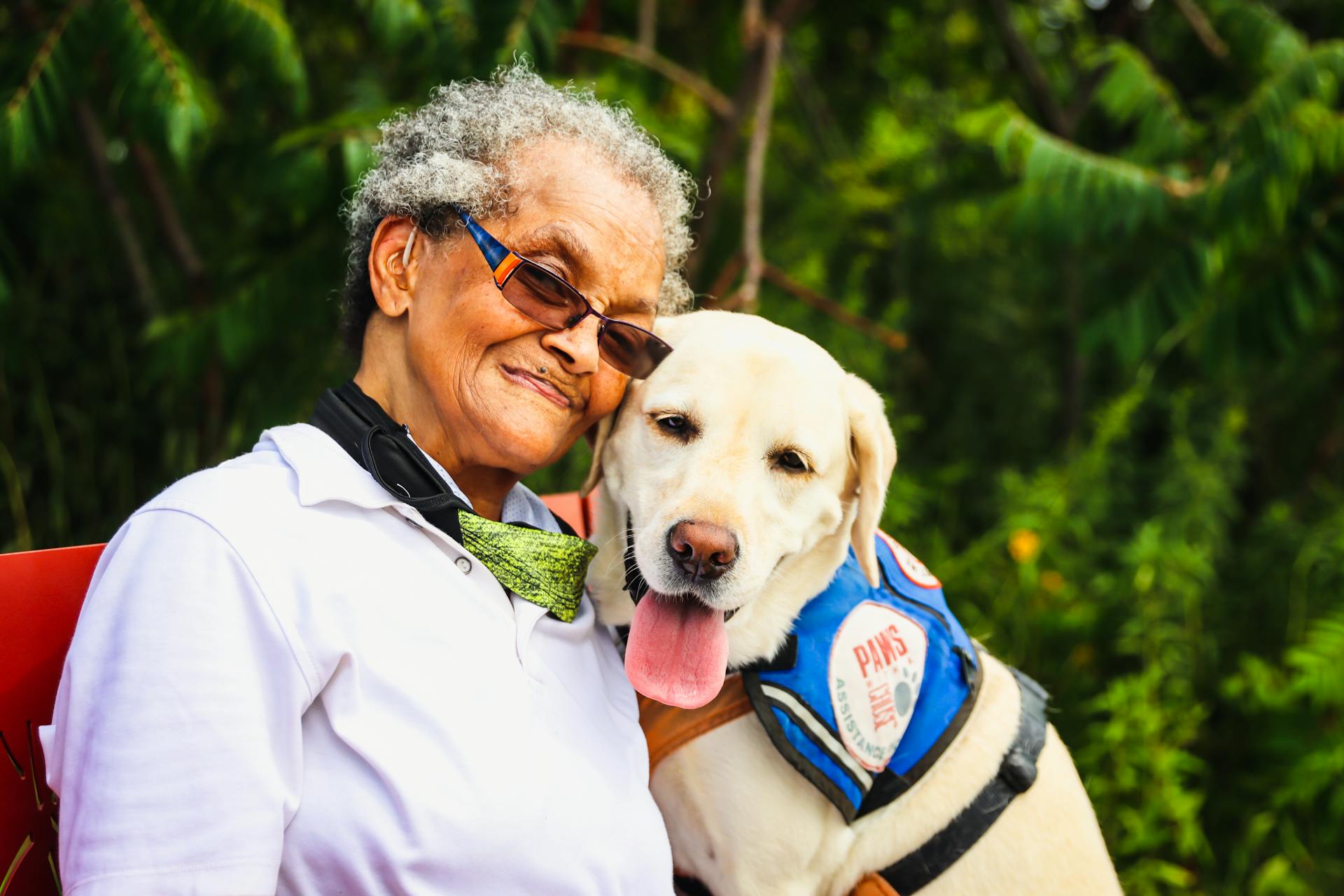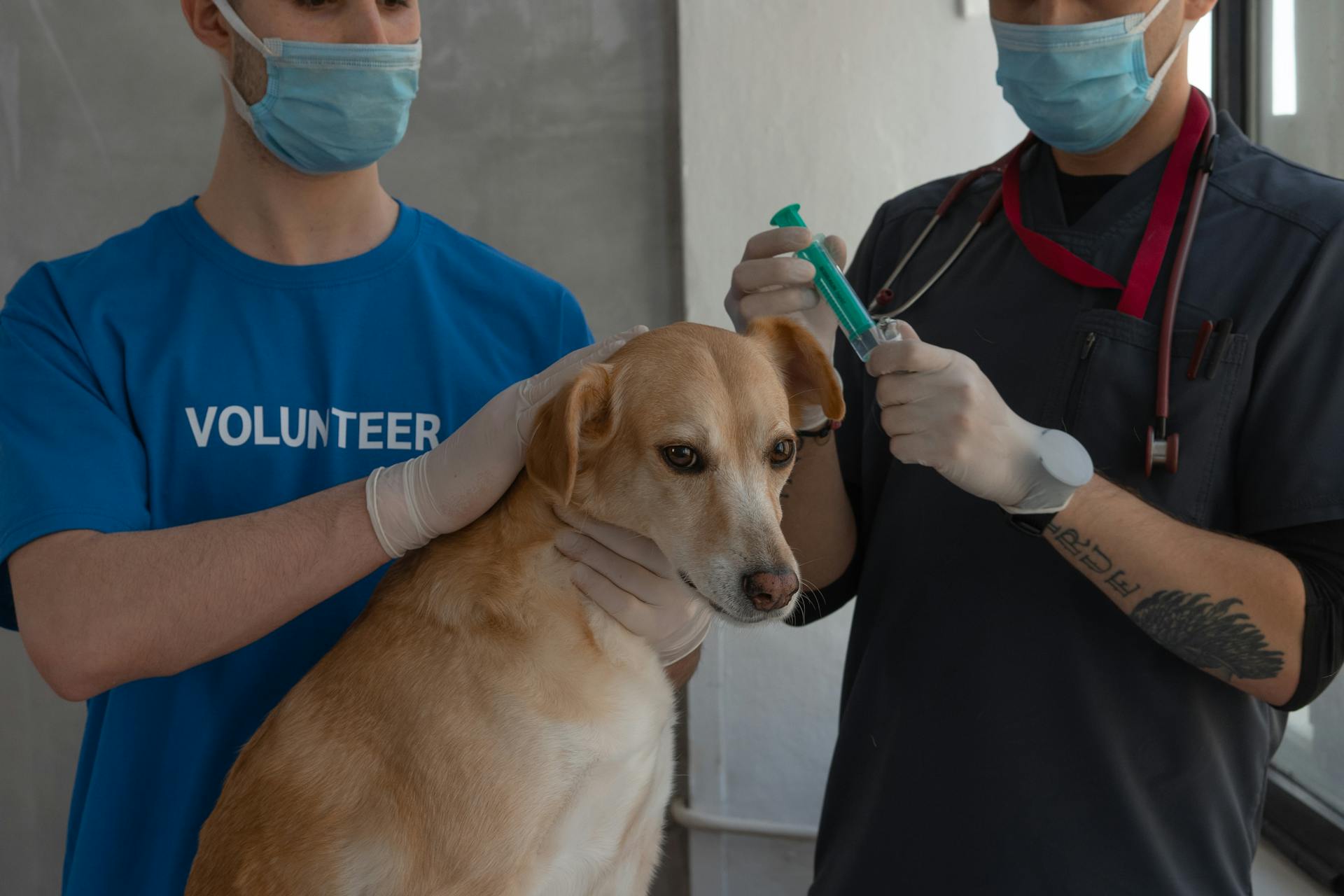
Dog dementia, also known as Canine Cognitive Dysfunction (CCD), is a common age-related condition affecting many older dogs.
It's estimated that up to 60% of dogs over the age of 15 will develop some form of dementia.
Dogs with dementia may exhibit changes in their behavior, such as pacing, panting, and restlessness, especially at night.
What Is Canine Dementia?
Canine dementia, also known as Canine Cognitive Dysfunction Syndrome (CDS), is a neurodegenerative condition that affects older dogs.
Prevalence of CDS in the pet dog population is estimated between 14% to 35%.
Dogs with CDS often display slowly progressive signs of behavioral change and dementia.
Confusion and anxiety are common symptoms of CDS, which can impact a dog's quality of life.
Changes in sleep patterns and a decrease in interaction with owners are also signs of CDS.
Early in the course of the disease, pet owners may attribute subtle clinical signs to normal aging.
However, as the disease progresses, severe cognitive impairment can impact quality of life.
Additional reading: How Long Can a Dog Live with Dementia
Signs and Symptoms
Dogs with dementia often exhibit progressive symptoms that worsen over time.
Some common symptoms of dementia in dogs include disorientation, changes in behavior, anxiety, and impaired memory. These symptoms can manifest in various ways, such as pacing back and forth or in circles, getting lost in familiar places, and staring into space.
A veterinarian should be consulted to rule out other health issues like blindness, deafness, urinary tract infections, kidney disease, arthritis, tumors, infections, or inflammation of the brain.
The DISHA acronym stands for Disorientation, Interactions with people and other pets that have changed, Sleep-wake alterations, House soiling, and Anxiety. However, this classification does not cover many other important symptoms, such as memory and learning problems, appetite changes, and physical signs like visual impairment and swaying.
Here are some specific behavioral symptoms that can be associated with canine cognitive dysfunction:
- Appearing lost or confused
- Pacing back and forth or circling in one direction
- Staring off into space or at walls
- Walking into corners or other tight spaces and staying there
- Getting lost in familiar places
- Waiting at the hinge side of the door to go out
- Failing to get out of the way when you open a door
- Difficulty getting all the way into bed
- Falling off things
- Having trouble with stairs and ramps
- Acting frightened, shy, or avoidant of known people
- Losing enthusiasm for play
- Interacting less with other animals in the household or getting aggressive towards them
Causes of
As we explore the signs and symptoms of canine dementia, it's essential to understand the underlying causes of this condition. Scientists are still studying CCD, but research suggests that the brain atrophies as dogs age, especially in the portion responsible for learning and memory.

The brain atrophy is accompanied by the death of brain cells, which can lead to decreased nerve signaling. This is often caused by an abnormal protein buildup in the brain, similar to what's seen in Alzheimer's disease. Dogs with epilepsy and those who lead a sedentary lifestyle are more likely to develop CCD.
Dopamine depletion is another possible cause of canine cognitive dysfunction, although the cause of the depletion hasn't been identified. This can disrupt the normal functioning of the brain.
The accumulation of proteins or plaque in the brain can also lead to CCD. This buildup can disrupt nerve impulses and contribute to the development of the disease.
Here are some risk factors associated with CCD:
- Dogs with epilepsy
- Dogs that lead a sedentary lifestyle
- Small-breed dogs
It's worth noting that the exact causes of CCD are still not fully understood, and more research is needed to uncover the underlying mechanisms of this disease.
Symptoms of Dementia
Dogs with dementia can exhibit a range of symptoms, including disorientation, confusion, and changes in behavior.
Disorientation and confusion can manifest in various ways, such as getting lost in familiar places or staring into space.
Changes in sleep patterns are also common, with dogs sleeping more during the day and less at night, or vice versa.
Some dogs may pace back and forth or in circles, often turning consistently in one direction.
They may also get lost in familiar places, wait at the "hinge" side of the door to go out, or fail to get out of the way when someone opens a door.
Other symptoms include failing to remember routines, starting them and getting only partway through, and sundowning.
The symptoms of canine dementia are progressive, meaning they get worse over time.
Here are some specific behavioral symptoms associated with canine cognitive dysfunction:
- Pacing back and forth or circling in one direction
- Staring off into space or at walls
- Walking into corners or other tight spaces and staying there
- Getting lost in familiar places
- Getting trapped under or behind furniture
- Waiting at the hinge side of the door to go out
- Failing to get out of the way when you open a door
- Difficulty getting all the way into bed
- Falling off things
- Having trouble with stairs and ramps
- Acting frightened, shy, or avoidant of known people
- Losing enthusiasm for play
- Interacting less with other animals in the household or getting aggressive towards them
- Seeking attention less, or seeming withdrawn
- Sleeping more during the day and less at night
- Wandering at night
- Startling easily
- Forgetting how to "ask" to go outside
- Forgetting housetraining entirely
- Being more sedentary/passive
- Being more agitated or performing repetitive behaviors
- Barking for no clear reason and/or for long periods
- Being quiet when barking would usually occur
- Forgetting cues and trained behaviors
- Having difficulties learning anything new
- Experiencing trouble eating or drinking
- Having an increase in appetite
- Becoming scared of things that used to be fine
- Chronic depression
- Losing appetite
- Getting generally more fearful or anxious
- Visual impairment
- Swaying, falling, and possibly dropping of the head
Diagnosis
Diagnosing dog dementia requires a thorough examination by a veterinarian. They will evaluate your dog's overall health status and cognitive functions through a complete physical examination.
Your veterinarian will also run routine blood tests, thyroid testing, ultrasounds, and X-rays to rule out other diseases that may lead to behavioral changes associated with canine cognitive dysfunction syndrome. Advanced imaging like an MRI or CT scan may also be recommended.
To determine if your dog has CDS, your veterinarian may use the DISHAA scoring table, which groups clinical signs based on changes in behavior as well as interactions. Disturbance of the sleep-wake cycle is often one of the first signs of CDS.
The diagnosis process is a process of elimination, where your veterinarian will rule out other potential medical issues before diagnosing your dog with CCD. Regular vet visits are essential for older dogs, and the American Animal Hospital Association recommends checkups every six months for senior dogs.
What Causes?
Dog dementia is a complex condition, and understanding its causes is essential for proper diagnosis. The causes of dog dementia are not well known, but research suggests that accumulations of sticky proteins called beta-amyloid plaques around neurons play a significant role.
These plaques can interrupt nerve impulse transmission, affecting the brain's ability to function properly. As dogs age, their brains atrophy, leading to the death of some cells.
The breakdown of neurons results in so-called neurofibrillary tangles, which further disrupt brain function. This damage is linked to aging and can impact the areas of the brain responsible for learning, memory, and coordination.
Diagnosing
To diagnose dementia in dogs, you'll need to give your veterinarian a thorough history of your dog's health, including the onset and nature of symptoms and any incidents that might have caused them.
Routine blood tests, thyroid testing, ultrasounds, and X-rays are used to rule out other diseases that may lead to behavioral changes associated with canine cognitive dysfunction syndrome.
Your veterinarian will perform a complete physical examination to evaluate your dog's overall health status and cognitive functions.
A diagnosis of canine cognitive dysfunction means ruling out other potential medical issues, including vestibular disease and degenerative myelopathy.
Your veterinarian may recommend advanced imaging like a CT scan or MRI to help with the diagnosis.
It's essential to take your dog to the veterinarian as soon as you notice any potential symptoms of CCD, as the earlier your dog is diagnosed, the better you can manage their symptoms.
Diagnostic tests like blood work and urinalysis may be recommended to check for other senior health problems.
Once other health issues have been ruled out, your vet might determine that your dog has canine cognitive dysfunction.
You can't diagnose your dog yourself, as every symptom could also be a symptom of another disease or condition.
Regular vet visits are crucial for older dogs, with the American Animal Hospital Association recommending checkups every six months for senior dogs.
Recommended read: Vet Dogs Dog Treats
Treatment Options
Dogs with dog dementia require lifelong therapy and support, and there are several things you can do at home to help their cognitive functions. Maintaining a healthy and stimulating environment can help slow the progression of cognitive decline.
A daily routine of exercise, play, and mental stimulation can be very beneficial. This can include activities like puzzle feeders, playing hide and seek, and teaching them tricks.
Medication and behavioral therapy can also be used to help keep your dog comfortable and active. Your veterinarian may recommend prescription diets for brain health, such as Hills' b/d, Royal Canin's Mature Consult, and Purina Pro Plan's Neurocare, which are rich in antioxidants and other nutrients that support cognitive function.
Suggestion: Service Dogs vs Emotional Support Dogs
Additional supplementation of omega fatty acids can also be extremely beneficial to dogs with dog dementia.
Some dogs may benefit from anti-anxiety medications if anxiety-related symptoms are a major factor of their dog dementia. Anipryl (selegiline) is a prescription medication geared towards dogs with dog dementia that inhibits MAOB, allowing neurotransmitters to remain in the brain where they are needed.
Your veterinarian will evaluate your dog periodically to monitor their response to therapy and the progression of symptoms. It's essential to notify your vet immediately if you notice any behavioral changes in your dog.
Here are some treatment options for dog dementia:
Managing Canine Dementia
Canine cognitive dysfunction syndrome (CDS) is a common neurodegenerative condition in older dogs, affecting up to 35% of the pet dog population.
The symptoms of CDS can be similar to those of Alzheimer's Disease in humans, including confusion, anxiety, changes in sleep patterns, and a decrease in interaction with owners.
Early signs of CDS can be subtle and may be mistaken for normal aging.
Dogs with CDS can benefit from mental stimulation, such as learning new tricks and games that challenge their brain.
Some effective supplements for dog dementia include SAMe (S-adenosylmethionine), Denamarin, silybin, vitamin E, Cholodin, and omega-3 fatty acids, which can help reduce the severity of symptoms.
Here are some antioxidant supplements that can be added to a dog's diet:
- SAMe (S-adenosylmethionine)
- Denamarin
- Silybin
- Vitamin E
- Cholodin
- Omega-3 fatty acids
It's essential to consult with a veterinarian before adding any supplements to a dog's diet.
Alternative Therapies
Alternative therapies can be a valuable complement to conventional treatments for canine dementia. Traditional Chinese medicine, for instance, operates on the molecular and atomic levels, addressing energy imbalances.
Acupuncture is one alternative therapy that can be used to treat dog dementia. Thomas recommends it as a preferred treatment option.
Chinese herbs and supplements can also be beneficial in managing canine dementia. They can help address underlying energy imbalances.
Consider reading: Dog Food for High Energy Dogs
Diet modification is another aspect of traditional Chinese medicine that can be applied to dog dementia. By adjusting your dog's diet, you can help alleviate symptoms and improve their quality of life.
Energy medicine is a holistic approach that can be used in conjunction with conventional treatments. It's a powerful tool for addressing the emotional and spiritual aspects of canine dementia.
Supplements
Supplements can be a valuable addition to your dog's diet when managing canine dementia.
SAMe (S-adenosylmethionine) is an antioxidant supplement that has proven effective in reducing the severity of CCD symptoms.
Antioxidant nutritional supplements such as Denamarin, silybin, and vitamin E can also be added to your dog's diet. Omega-3 fatty acids and Cholodin are other options that may help.
Solliquin contains an amino acid that can reduce CCD-related anxiety.
Talk to your vet before adding supplements to your dog's diet, as they can help with finding the right supplements and provide guidance on dosage.
Related reading: Dog Dementia Supplement
Life Expectancy
Canine cognitive dysfunction is a degenerative process that occurs in a dog's senior years, similar to Alzheimer's in humans.
The prognosis for life expectancy can be tricky to make, as there hasn't been a specific timeframe established for when a dog's quality of life will be significantly impacted by dementia.
Working with your veterinarian and tracking your dog's quality of life is the best way to monitor their health and cognitive functioning.
This will help you determine when your dog is letting you know it's time to make decisions about their care and well-being.
Related reading: When to Put a Dog down with Dementia
Mental Stimulation
Mental Stimulation is a crucial aspect of managing canine dementia. Engaging your dog's brain can have a significant impact on its overall well-being.
Teaching your dog fun tricks and games is an excellent way to challenge its brain. Options that can be played throughout its life are best, so choose activities that will keep your dog engaged for years to come.
Puzzle toys are a great way to provide mental stimulation for senior dogs. These toys require problem-solving skills, which can help slow down cognitive decline.
Socializing with other dogs and people is also essential for maintaining your dog's mental health. Even simple interactions, such as walks or playdates, can have a positive impact.
Here are some fun activities you can try with your dog:
- Playing with puzzle toys
- Learning simple commands
- Socializing with other dogs and people
These activities can help slow down cognitive decline and improve your dog's overall quality of life.
Frequently Asked Questions
What are the three stages of dog dementia?
The three stages of dog dementia are Mild, Moderate, and Severe, each with distinct symptoms and progression. Understanding these stages is crucial for early detection and effective management of canine cognitive decline.
What is the best medication for dogs with dementia?
For dogs with dementia, Selegiline hydrochloride (L-deprenyl hydrochloride) is the most commonly prescribed medication to help manage symptoms. Consult with a veterinarian to determine the best course of treatment for your dog.
How to calm down a dog with dementia?
Establish a consistent daily routine to help reduce your dog's anxiety and confusion, including regular sleep schedules, walks, and feeding times
What is the final stage of dog dementia?
The final stage of dog dementia is characterized by severe disorientation, leading to unusual behaviors such as excessive barking, pacing, and a lack of response to familiar commands or names. If you suspect your dog is experiencing this stage, it's essential to consult with a veterinarian for proper guidance and care.
How long should I let my dog live with dementia?
The lifespan of a dog with Canine Cognitive Dysfunction (CCD) varies, but with early treatment, they can live a normal life span for their breed. However, severe cases often result in euthanasia within 2 years of diagnosis.
Sources
- https://www.petmd.com/dog/conditions/neurological/dog-dementia
- https://www.vetspecialists.com/vet-blog-landing/animal-health-articles/2022/11/15/canine-cognitive-dysfunction-syndrome-(cds)
- https://www.thewildest.com/dog-health/canine-dementia-signs-symptoms-treatments
- https://www.thesprucepets.com/dementia-in-dogs-1117412
- https://dogdementia.com/guide-to-canine-cognitive-dysfunction-2023/
Featured Images: pexels.com


